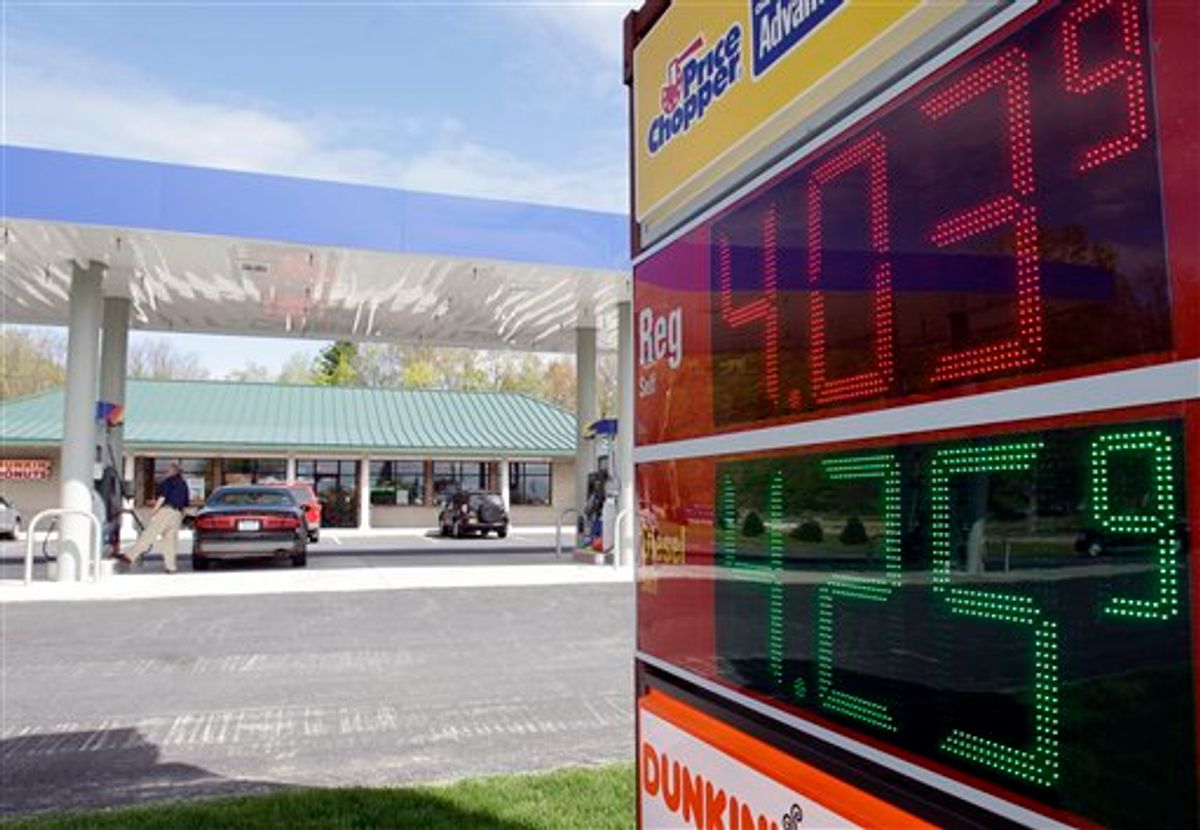The Senate blocked a bill Tuesday that would repeal about $2 billion a year in tax breaks for the five biggest oil companies, a Democratic response to $4-a-gallon gasoline that might fare better when Congress and the White House negotiate a deal later this year to increase the government's ability to borrow.
The bill was defeated on a procedural vote. But Democrats hope to build their case to include the measure in a deficit-reduction package being negotiated by key lawmakers and the Obama administration. Lawmakers from both parties are demanding deficit reduction as part of deal to increase the government's ability to borrow and avoid an unprecedented default on U.S. Treasury bonds.
"This bill says that even the most rich and powerful among us must do their fair share to help us reduce the deficit," said Sen. Robert Menendez, D-N.J., the bill's sponsor. "Their high-priced lobbyists cannot stop us from doing what is fair and what is right."
Republicans and some Democrats opposed the tax increase, saying it would hurt domestic drilling while doing nothing to reduce gas prices. The vote was 52-48 in favor of the measure, short of the 60 votes needed to advance it. Three Democrats -- Mary Landrieu of Louisiana, Ben Nelson of Nebraska and Mark Begich of Alaska -- joined with nearly all Republicans in opposing the measure. Two Republicans, Olympia Snowe and Susan Collins of Maine, voted for it.
White House spokesman Jay Carney blamed Senate Republican leaders, saying they were more interested in protecting tax breaks for profitable oil companies than finding more responsible ways to spend that money. Nonetheless, he said the vote was an important step toward repealing "these unwarranted subsidies" and said the administration would continue to pursue the matter.
The U.S. Chamber of Commerce called the tax increases "misguided, unwarranted and ultimately counterproductive."
The measure would have affected Shell Oil Co., ExxonMobil, ConocoPhillips, BP America and Chevron Corp.
"This is not an energy strategy, this is a public relations strategy, this is a 'how do I get re-elected' strategy," said Sen. John Cornyn, R-Texas. "It does not solve the problem or the pain that Americans are feeling at the pump."
Some GOP lawmakers argued that the bill would increase gas prices further. However, the nonpartisan Congressional Research Service concluded that eliminating the tax breaks would be unlikely to result in higher gasoline prices, which are influenced by a host of factors. The report said the bill would raise about $1.2 billion in 2012. By comparison, the five oil companies had combined revenues of $1.5 trillion last year.
A GOP measure designed to increase offshore drilling is scheduled for a Senate vote on Wednesday, though it is not expected to pass, either. The Republican bill would force the Interior secretary to conduct offshore lease sales in the Gulf of Mexico, Virginia and Alaska that were delayed by the Obama administration after the Gulf oil spill.
Republicans argue that their bill, which is backed by the Chamber of Commerce, would increase domestic oil production, sending a signal to the market that could eventually lead to lower gas prices. Similar measures easily passed the Republican-controlled House.
"Americans aren't interested in scapegoats," said Senate Republican leader Mitch McConnell of Kentucky. "They just want to pay less to fill up their cars."
The White House opposed the Republican bills. Instead, President Barack Obama directed his administration this past weekend to ramp up U.S. oil production by adopting some of the GOP's strategies.
Gasoline is more than $4 a gallon in many parts of the country. The national average is $3.94 a gallon for regular unleaded, up from $2.87 a gallon a year ago, according to AAA.
Five Democratic senators, led by Missouri's Sen. Claire McCaskill, asked the Federal Trade Commission on Tuesday to investigate "potential price fixing of gasoline by U.S. refiners." The senators said U.S refineries have cut back production even as gas prices rose, increasing their profit margins.
The heads of the five oil companies defended the tax breaks at a Senate hearing last week, saying they just want the same tax advantages enjoyed by other industries. Together, they logged profits totaling $36 billion during the first quarter. The Democrats say that with profits that high, the big oil companies wouldn't miss tax breaks that average $2 billion a year.
"Why should Americans pay at the gas pump once and then give these subsidies to the oil companies a second time?" said Senate Majority Leader Harry Reid, D- Nev. "We believe we need to cut government spending," he said, adding, "The place to start is with these subsidies."
Obama has called for eliminating tax breaks for all oil and gas companies every year since he took office in 2009, a proposal that would raise an estimated $44 billion over the next decade. Lawmakers, including Democrats from oil-producing states, complained that Obama's proposal would raise taxes on many small and medium-sized businesses involved in oil production.
The Menendez bill would target only the five largest oil companies, raising about $21 billion over the same period. The White House issued a statement supporting the tax bill Tuesday, calling the tax breaks "wasteful subsidies."
Associated Press writer Dina Cappiello contributed to this report.



Shares